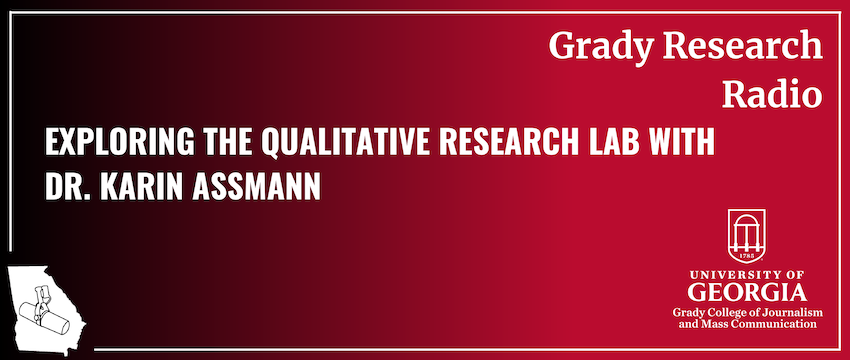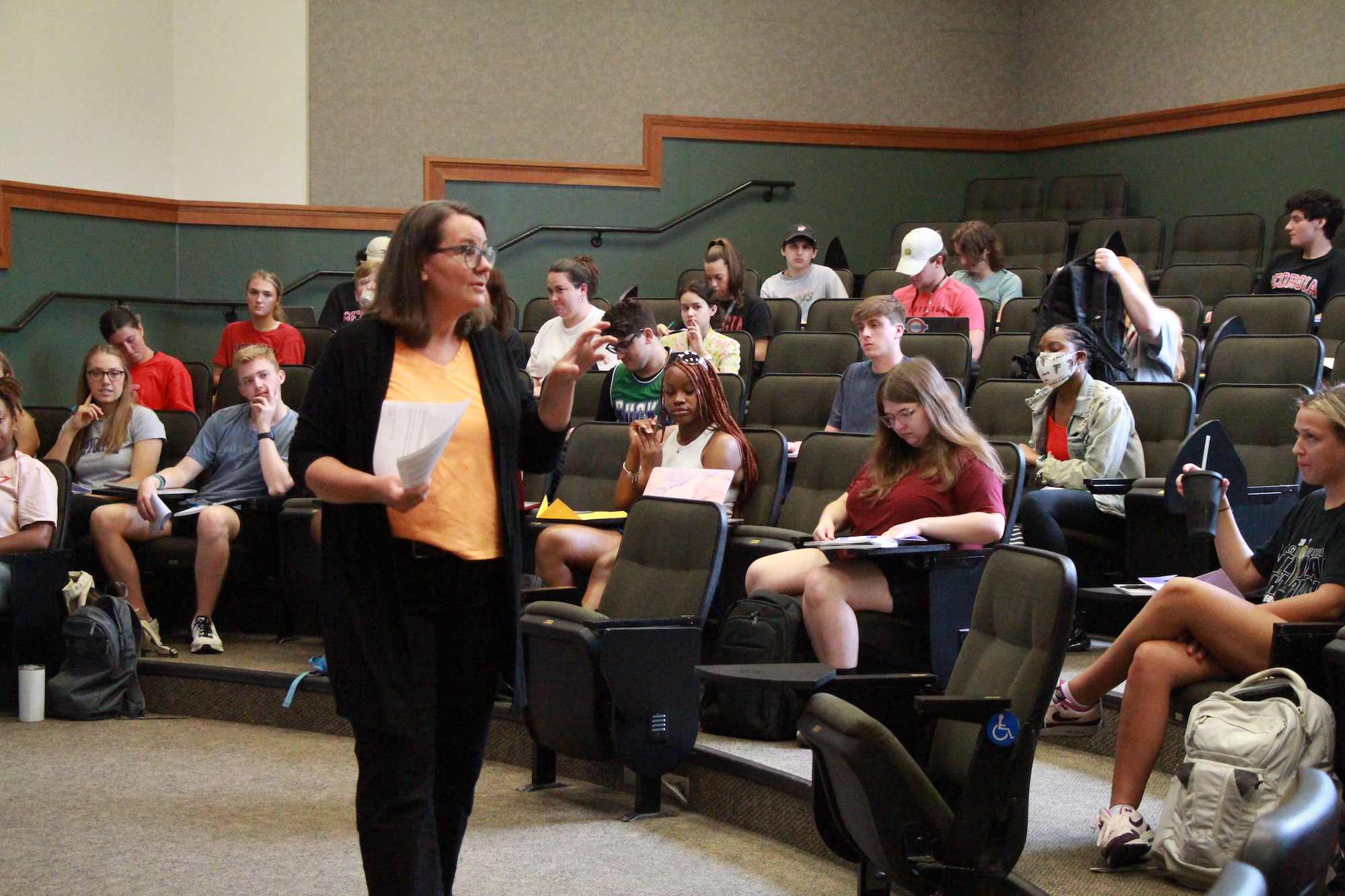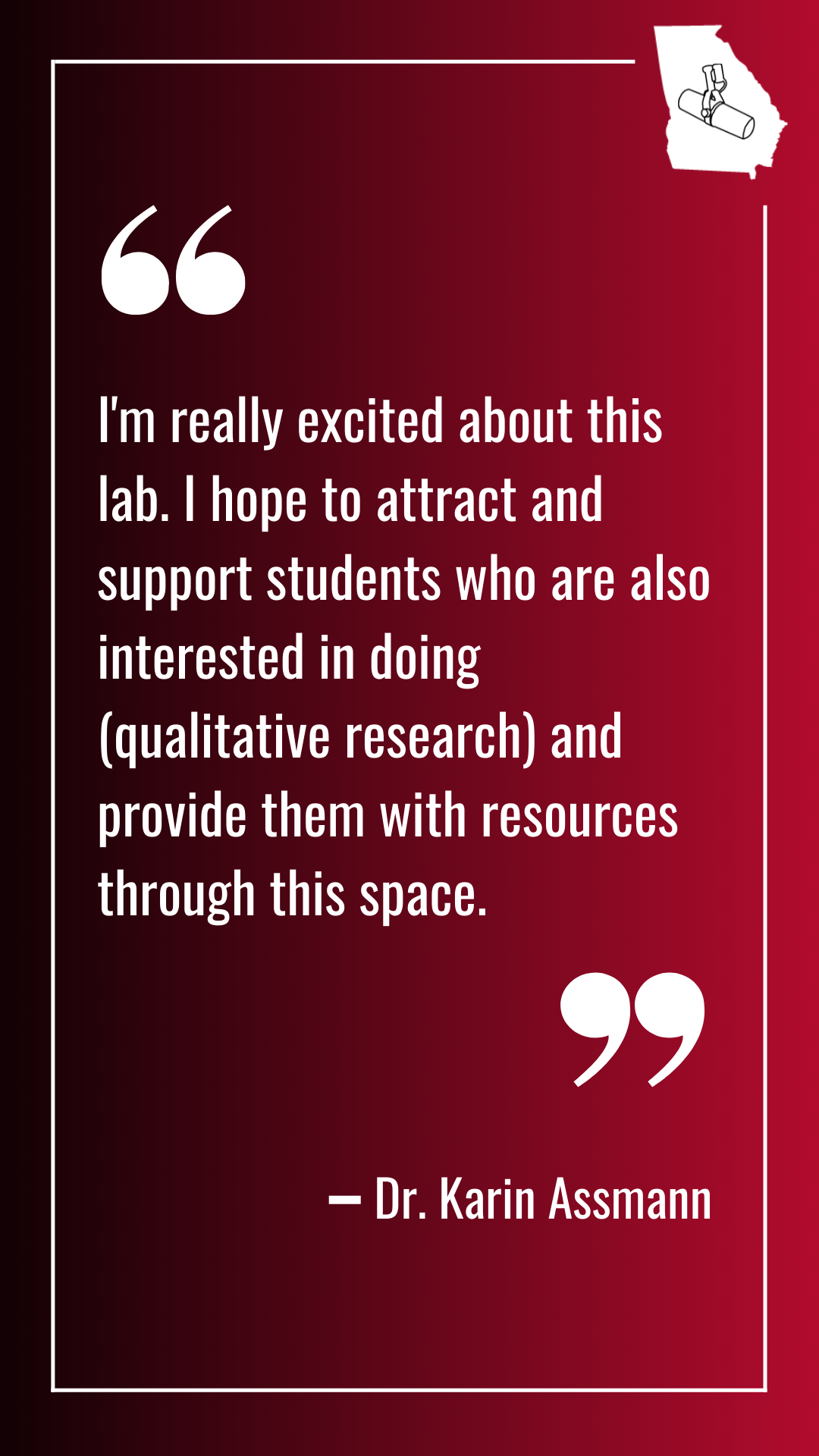Podcast: Exploring Grady College’s Qualitative Research Lab

Podcast: Exploring Grady College’s Qualitative Research Lab
Listen to Grady Research Radio
Apple Podcasts/Spotify/Stitcher
Recently, the Grady Research Radio podcast had the pleasure of featuring Dr. Karin Assmann, an assistant professor in the Journalism Department at Grady College, a former U.S. correspondent for Spiegel TV, and the director of the Qualitative Research Lab. The lab is for both graduate and undergraduate students who are interested in qualitative research, which, in very simple terms, involves collecting and analyzing non-numerical data.
In this interview, Dr. Assmann explains what goes on in her lab, speaks about recent studies conducted in the lab, and offers insight into how those interested can get involved.
Below is a transcription of the episode, edited for clarity and brevity.
Karin Assmann: So, qualitative research looks at performances and practices of human communication. The data that we work with is from interviews that we conduct, or focus groups, participant observations, ethnographies, documents and case studies.
For example, in a study I conducted with master’s student William Newlin, we looked at Fox News’s Sean Hannity’s media bashing during the weeks before and after presidential and midterm elections. So that means we obtain video and transcripts and searched for themes. The Qualitative Research Lab has a computer with really powerful qualitative data analysis software that we use to do that work.
The qualitative part, it doesn’t mean it’s higher quality. It just means the kind of data that we collect and the methods and the theoretical approaches we use are different than, for example, people using survey data.
Grady College: The Qualitative Research Lab is still very new, having started in Spring of 2022. At this point, most of the research coming out of the lab has been focused on news deserts in rural Georgia. Dr. Assmann goes on to explain.
Karin Assmann: I’ve had Center for Undergraduate Research Opportunities (CURO) students — students who are undergraduates who want to pursue research — do interviews with people in rural communities here in Georgia, asking them about their news and information needs and habits.
They would conduct these interviews, either in person or via phone or Zoom, and then download the audio files, import them, transcribe them and then analyze them to determine how people talk about the way they consume information or pursue information.
Grady College: Has the research conducted in this lab yet influenced anything outside the walls of Grady College?
Karin Assmann: I certainly hope that we’ve influenced some of the people who have seen our presentations. The CURO students, they presented during the symposium. I’m still finishing one of those papers, and I hope to turn that project, which is about rural Georgia, specifically one county in Georgia, into a pilot project that would help rural communities figure out how to better fulfill those information needs, given the fact that they may not have a local newspaper at all.
Grady College: While news desert research has been the primary focus so far, Dr. Assmann makes it clear that the Qualitative Research Lab is open to any kind of research that uses interview data or other non-quantitative data.

Karin Assmann: I’m hoping that this new cohort of master’s students will take the opportunity to come in here and do guided research with me. We’ll have the right kind of software that they need to answer some of the research questions that they might have.
We started this last semester, and I have to thank Dr. Janice Hume and Dr. Charles Davis, our dean, who gave the okay for this. I was asking for funding from our Department for every new student who wanted to do it and who needed a license for this software. It’s called MAXQDA, by the way. It was adding up. It was getting so expensive, I thought, why not create a lab where we have everything we need. Anybody can come in here with the data on their hard drive and use what we have.
I also wanted to create a space where we can actually talk through some of these things. That’s one of the other things that qualitative research is. It’s really figuring out the meaning of human beings’ expressions. Often, you don’t really discover themes or the meaning of things when you’re sitting alone at home. So, it’s great to have a team that you can sit around with and brainstorm directions that you could go in. That’s the kind of space that I wanted to create here.
Grady College: Dr. Assmann’s path to academia started as a professional journalist. She was the correspondent for a German news station called Spiegel TV, based in Washington.
Karin Assmann: I worked for print and radio, and I’ve been a producer, reporter and correspondent for television. As the industry evolved, I became more interested in finding answers to questions about the news media industry, like about journalists’ work conditions and practices and about how newsrooms worked. Of course, this was in part because I was working in a newsroom and wondering what was happening all around me.
My dissertation looked at how the demands of audience engagement labor affected journalists. For that, I interviewed 150 journalists and audience engagement editors and strategies. I also spent about two months in various newsrooms documenting work routines. There I found that my methodology of choice, of course, has always been qualitative.
That’s why I’m really excited about this lab, because I hope to attract and support students who are also interested in doing this kind of research and provide them with resources through this space, hopefully resulting in some conference presentations and journal publications.
I’m also the incoming head of the Association for Education in Journalism and Mass Communication’s (AEJMC) Culture and Critical Studies Division, which is traditionally a division that’s partial to qualitative research and one that’s really welcoming and supportive of grad students.
Grady College: How can those who are interested in working in the Qualitative Research Lab get in touch with you?
Karin Assmann: If you’re interested in working with me in this lab, just contact me. My email is KBA@uga.edu. Stop by my office. Just reach out to me and talk to me about what your research interest is and see if it aligns with the kind of work that we do here. And then we’ll take it from there.
